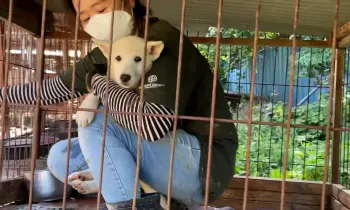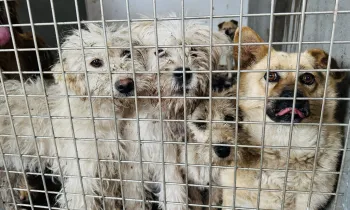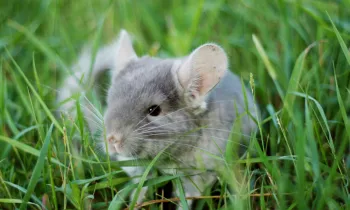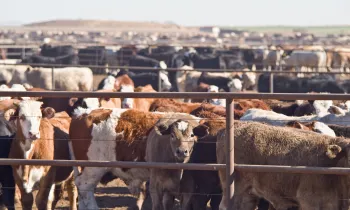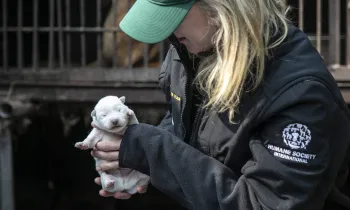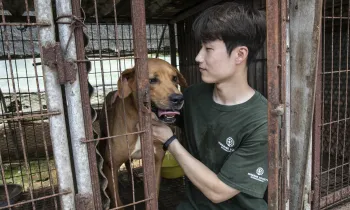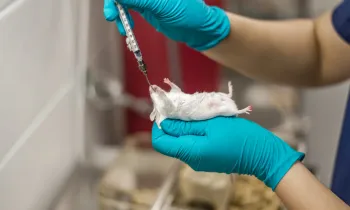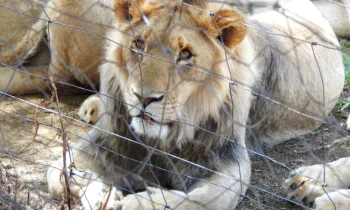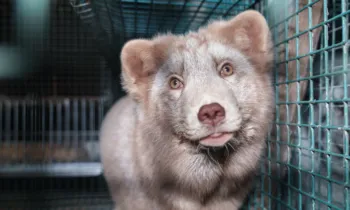Search
Found 4150 results
Humane Society International i LIFE ratuje 65 psów z okrutnej hodowli klatkowej
SEUL—Aż 65 psów udało się uratować z psiej farmy w Korei Południowej na wyspie Jindo, znanej jako rzeźnia psów zabijanych na mięso. Dzięki akcji organizacji zajmujących się ochroną praw zwierząt Humane Society International/Korea i koreańskiej grupy obrońców praw zwierząt LIFE, psy czeka bezpieczna
Attivisti cinesi salvano 19 cani da un macello di Yulin, intento a uccidere cani per il famigerato “festival” della carne di cane
PECHINO—Un gruppo di attivisti cinesi ha salvato 19 cani da un macello illegale alla periferia di Yulin, a una settimana dall’inizio del famigerato “festival” annuale della carne di cane della città, durante il quale migliaia di cani e gatti saranno uccisi e mangiati. Le immagini scioccanti raccolte
Patru branduri de modă românești se angajează să renunțe la blănuri și se alătură programului Fur Free Retailer
BUCUREȘTI, România—Patru branduri de modă din România s-au angajat să renunțe la blănuri după ce au colaborat cu Humane Society International/Europe și au devenit primii designeri din România care s-au alăturat programului global Fur Free Retailer. Ioana Ciolacu, Muse um Concept, REDU și OCTAVIA
Lipsa dezbaterilor pe reducerea creșterii animalelor, marele eșec al summitului de la Glasgow
LONDRA—În timp ce Conferința pentru Schimbări Climatice de la Glasgow (COP26) se pregătește să dezvăluie angajamentele finale concentrate pe reducerea emisiilor din energie, transport și alte sectoare, campaignerii Humane Society International, unul dintre cele mai mari ONG-uri de protecție a
Fast facts on battery cages in Canada
Did you know? There are approximately 26 million laying hens in Canada. Most of them are kept confined in cramped, barren cages. Battery cages were designed in the 1940s to maximize production and lower animal care costs as a response to the growing demand for eggs. Currently, Canadian hens do not
Flight to freedom! 27 South Korean dog meat farm rescues travel to the United States in search of loving homes
SEOUL—One month after the South Korean government announced a bill to ban the dog meat industry, 27 dogs rescued from a dog meat farm in Asan, Chungcheongnam-do have flown to the United States in search of loving homes. At the time of rescue in March this year by animal charity Humane Society
Families of dogs threatened by Montreal’s unfair BSL bylaw granted temporary reprieve
The City of Montreal is granting an extension to families with dogs affected by its discriminatory dog bylaw. The decision follows a recent court challenge against the municipality over a notice sent to 520 city residents, ordering them to relinquish their dogs due to incomplete permit applications
Notizia storica: la Corea del Sud annuncia piano per vietare entro il 2027 l’industria della carne di cane; un “sogno che si avvera” per l’organizzazione animalista Humane Society International/Korea
SEOUL—In un annuncio storico, il Governo della Corea del Sud ha dichiarato che entro la fine dell’anno in corso presenterà una proposta di legge per vietare l’industria della carne di cane, che vede fino a un milione di cani allevati e uccisi per il consumo umano ogni anno. In un incontro tenutosi
Historyczna decyzja o wprowadzeniu przez Koreę Południową zakazu hodowli psów na mięso do 2027 roku jest “spełnieniem naszych marzeń”
SEUL, Korea Południowa—W historycznej deklaracji rząd Korei Południowej oświadczył, że do końca 2023 roku przyjmie ustawę zakazującą hodowli psów na mięso, w których zabija się każdego roku do miliona zwierząt. Na specjalnym spotkaniu w Seulu z udziałem Ministerstwa Rolnictwa, Żywności i Spraw Wsi
Government action needed to curb explosion in “cruelest of cruel” animal tests in South Korea, says Humane Society International
SEOUL — Korean laboratory animal statistics published this week by the Ministry of Agriculture, Food and Rural Affairs revealed record-high animal use in 2018, and that one in every three animals in a Korean laboratory (38%) is subject to a chemical poisoning experiment – the most severe category of
Cecil the lion died 10 years ago. The killing didn't.
BRUSSELS—Ten years ago on July 1, 2015, an American hunter seeking a trophy shot an arrow at an African lion named Cecil just outside the boundaries of Hwange National Park in Zimbabwe. The senseless killing of Cecil, a lion who was being studied by scientists and beloved by park visitors, created a
EU science body, EFSA, declares systemic animal suffering on Europe’s fur farms
BRUSSELS—Fur farming across the European Union fails to meet basic animal welfare needs for mink, foxes, raccoon dogs and chinchillas, says the European Food Safety Authority in its official scientific opinion published today. In response, leading animal protection charity Humane World for Animals
